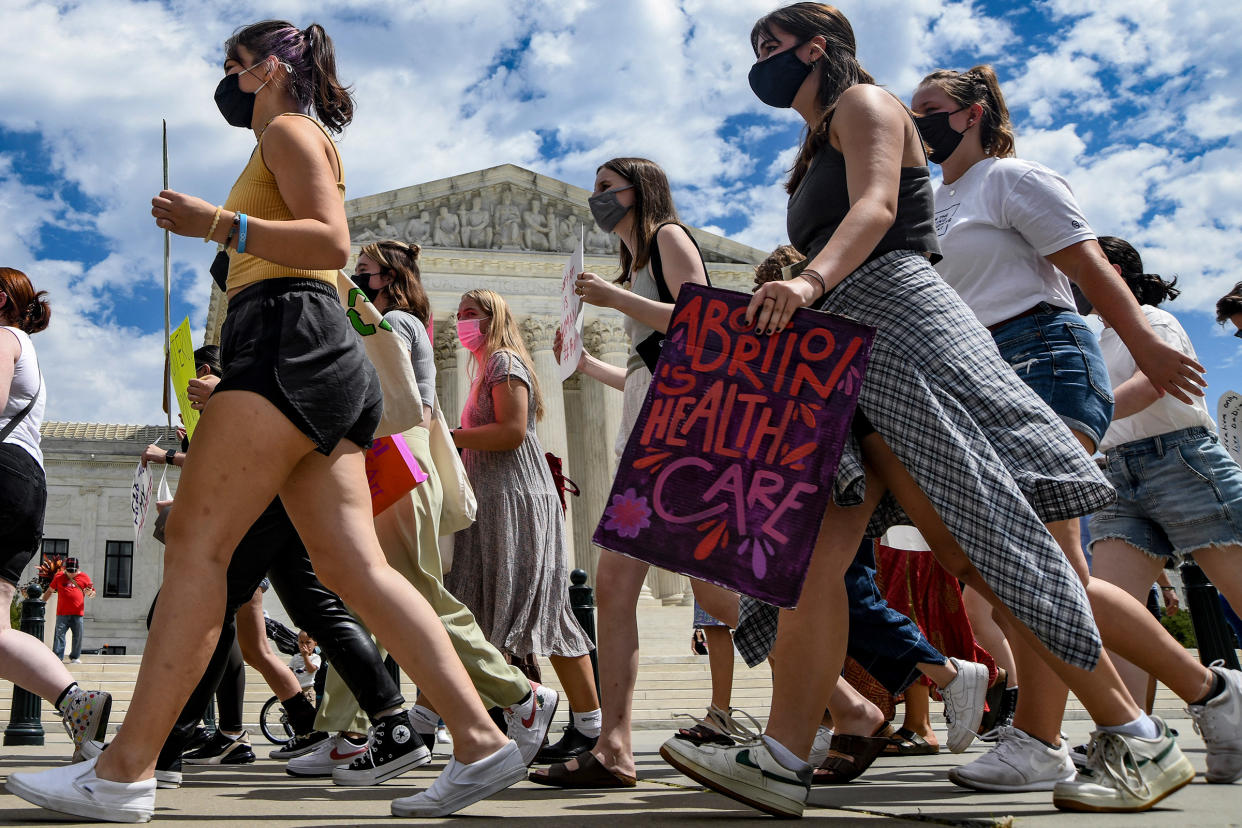What We Fear in the Wake of the Texas Abortion Law

Demonstrators outside the U.S. Supreme Court in Washington, D.C., days after the justices declined to block a near-total ban on abortion in Texas, Sept. 4, 2021. Credit - Kenny Holston—The New York Times/Redux
On Sept. 1, Texas enacted an extreme law that effectively ended abortion care in the state. Since then, clinics in states on the western and northern borders have seen a dramatic increase in patient visits and calls from abortion funds. But here in the Gulf region, not much has changed. And that might be the most alarming news of all.
There is no region more crippled by abortion restrictions than the Deep South. Across the more than 800 miles along the Gulf Coast between the eastern edge of Texas and the end of the Florida panhandle, there are fewer than a dozen abortion clinics, and Louisiana, Mississippi and Alabama require a waiting period of 24 or 48 hours between in-person visits to the clinic. That means a traveling patient must either make multiple trips or find the resources for some combination of housing, food, child care and time off work, in addition to paying for the abortion. Most abortion patients come from low-income households, and state laws down here prohibit non-employer-based insurance from covering abortion.
Read More: In Texas, Rape Crisis Centers Struggle to Respond to New Abortion Law
So it is that with Texas prohibiting abortion as early as 14 days after a missed period, clinics in states like New Mexico and Oklahoma are seeing a flood of new appointments, but those in Louisiana, Mississippi and Alabama are not. While our phones at West Alabama Women’s Center ring more than before, it is nowhere near what we would expect with one of the nation’s largest states eliminating nearly all abortion care. It’s not terribly surprising, though. With enough hoops to get through, of course people will be deterred from seeking an abortion in the Deep South. That was the intention.
Those who have the resources are able to travel, some as far as Illinois. But those who don’t? What are they doing now?
It’s a thought that consumes us daily. In Alabama, we’ve long seen patients from Mississippi, where there is just one clinic, and since Hurricane Ida, we’ve seen Louisiana patients unable to get into their own booked clinics. So it’s unlikely that these states are taking in many patients from East Texas.
Read More: I Can’t Do My Job as a Pastor With Abortion Laws Like Texas’ S.B. 8 in Place
Our fear is that pregnant people wanting an abortion have simply stopped trying to access the procedure-—at least for now. Because the ban has continued to have court challenges, including one from the Justice Department, those who are early in their pregnancies may just be waiting, hoping that a new hearing might mean a chance to stay in the state and get a termination. After all, if there will be a judicial review in two weeks and it takes two weeks to book an appointment in Louisiana, does it really make a difference?
Unfortunately, it does. Whether this barrier to health care is temporary or permanent, one thing we know for certain is that people who decide to end their pregnancies will now be doing so later in gestation—either because of waiting for legal abortion to return in Texas or needing to book out-of-state visits weeks in advance. These delays will increase health risks as well as financial burdens and lead more people to take legal risks to terminate. What they will not do, for the large part, is make Texans and others affected in the region decide they should just give birth.
Read More: How Texas’ Abortion Ban Will Lead to More At-Home Abortions
At our clinic, we will continue to do anything we can to meet this need as it arises. We now offer state-mandated informed-consent materials via certified mail, thus starting the clock on the 48-hour waiting period and eliminating one visit, which can be critical for patients traveling hundreds of miles. We will also increase our hours if needed so more patients can access the abortion care they need as quickly as possible, as is their constitutional right.
The problem is this may be just the beginning. With a number of other states considering similar bans—notably Florida—this crisis may get far worse. Florida is currently a destination for those in the region who are unable to navigate their states’ multi-visit requirements. It is also the only state in the region with a number of clinics that is more aligned with the number of people living there. A near total abortion ban would not just cripple that state but every state around it. If Florida’s clinics were unavailable, the domino effect would essentially overflow the Southeast.
Abortion has always existed. Legal or not, it will continue to exist. Texas is playing a dangerous constitutional game—and using pregnant people as collateral.

